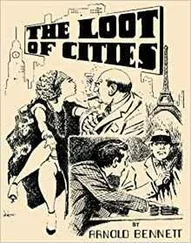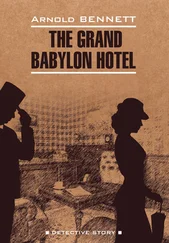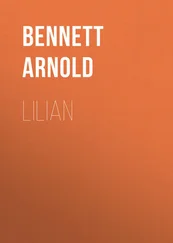Arnold Bennett - Riceyman Steps
Здесь есть возможность читать онлайн «Arnold Bennett - Riceyman Steps» — ознакомительный отрывок электронной книги совершенно бесплатно, а после прочтения отрывка купить полную версию. В некоторых случаях можно слушать аудио, скачать через торрент в формате fb2 и присутствует краткое содержание. Жанр: unrecognised, на английском языке. Описание произведения, (предисловие) а так же отзывы посетителей доступны на портале библиотеки ЛибКат.
- Название:Riceyman Steps
- Автор:
- Жанр:
- Год:неизвестен
- ISBN:нет данных
- Рейтинг книги:3 / 5. Голосов: 1
-
Избранное:Добавить в избранное
- Отзывы:
-
Ваша оценка:
- 60
- 1
- 2
- 3
- 4
- 5
Riceyman Steps: краткое содержание, описание и аннотация
Предлагаем к чтению аннотацию, описание, краткое содержание или предисловие (зависит от того, что написал сам автор книги «Riceyman Steps»). Если вы не нашли необходимую информацию о книге — напишите в комментариях, мы постараемся отыскать её.
Riceyman Steps — читать онлайн ознакомительный отрывок
Ниже представлен текст книги, разбитый по страницам. Система сохранения места последней прочитанной страницы, позволяет с удобством читать онлайн бесплатно книгу «Riceyman Steps», без необходимости каждый раз заново искать на чём Вы остановились. Поставьте закладку, и сможете в любой момент перейти на страницу, на которой закончили чтение.
Интервал:
Закладка:
Mr. Earlforward, strolling towards the steps, had chanced—if in this world there is such a thing as chance—to see Mrs. Arb, all dressed, presumably, for church—standing in her shop and regarding the same with the owner's critical, appreciative eye. Mr. Earlforward had a good view of her, as anybody else might have had, because only the blue blind of the door was down, this being the recognized sufficient sign to the public of a shut shop. The two small windows had blinds, but they were seldom drawn, except to protect butter against sunshine. The pair had exchanged smiles, Mrs. Arb had hospitably unlocked, and Mr. Earlforward had entered. To him she presented a finely satisfactory appearance, dressed in black, with vermilion flowers in her hat, good shoes on her feet, and good uncreased gloves held in her ringed hand. She was slim—Mr. Earlforward thought of her as petite —but she was imposing, with all her keen restlessness of slight movements and her changing glance. No matter how her glance changed it was always the glance of authority and of intelligence.
On her part, Mrs. Arb beheld Mr. Earlforward with favour. His pointed short beard, so well trimmed, seemed to give him the status of a pillar of society. She still liked his full red lips and his fresh complexion. And he was exceedingly neat. True, he wore the same black, shirt-hiding tie as on weekdays, and his wristbands were still invisible; his hat and overcoat were not distinguished! But he had on a distinguished new blue suit; she was quite sure that he was inaugurating it that day. His slight limp pleased and touched her. His unshakable calmness impressed her. Oh! He was a man with reserves, both of character and of goods. Secure in these reserves he could front the universe. He was self-reliant without being self-confident. He was grave, but his little eyes had occasionally a humorous gleam. She had noticed the gleam even when he picked up the carving-knife on Thursday night. His demeanour in that dreadful crisis had been perfect. In brief, Mr. Earlforward, considered as an entity, was nearly faultless.
Mr. Earlforward, on the other hand, was still secretly trembling as he realized more and more clearly the dangers which he had narrowly escaped in the Thursday night affair; and he had not begun to tremble until Friday morning!
"Rather early, isn't it, if you're going to church?" he suggested.
"I always like to be early if it's a strange church, and I've not been in there at all yet."
"St. Andrew's?"
"I don't know what its name is. The one up the steps in the middle of the Square."
" Yes. St. Andrew's, that is."
Without another word they then by a common impulse both moved out of the shop, which Mrs. Arb smartly locked up. In spite of the upset caused by Elsie's defection, and the prospect of future trouble and annoyance in this connexion, they were very happy, and they had quite overlooked the fact that their combined years amounted to ninety, or thereabouts. The sun was feebly shining on the Sabbath scene. The bells of St. Andrew's were jangling.
"I see you have some plant-pots on your top windowsill," observed Mrs. Arb. "Do you ever water them?"
An implied criticism! Mr. Earlforward enjoyed it, for it proved that they were getting intimate, as, indeed, became two people who had slept (well) opposite one another in two chairs through the better part of a coldish night.
"I do not," said Mr. Earlforward, waggishly, stoutly. The truth was that for years he had seen the plant-pots without noticing them. They were never moved, never touched. The unconquerable force of nature was illustrated in the simple fact that one or two of the plants still sturdily lived, displaying a grimy green.
I love plants," said Mrs. Arb.
They passed up the steps, Mr. Earlforward a foot or so behind his heroine.
"Now what I don't understand," said she, turning upon him and stopping, "is why the Square should be so much higher than the road. It means that all the carts and things, even the milk-carts, have to go all the way round by Gilbert Street to get into the Square from the side. Why couldn't they have had it all on the same level?"
Exquisitely feminine, he thought! "Why couldn't they have had it all on the same level?" Absurd! Delicious! He adored the delicious, girlish absurdity.
"Well," he said. "It's like this. You see, in the old days they used to make tiles in Clerkenwell, and they scooped out the clay for the tiles in large quantities—and this is the result."
With a certain eagerness he amplified the explanation.
"I should never have thought of that," said Mrs. Arb ingenuously but archly. "What sort of church is St. Andrew's?"
"Oh! it was built in the 'thirties and cost £4,541. Cheap! I doubt if you'd build it to-day for twenty thousand. Supposed to hold eleven hundred people."
"Really! But I mean, is it High or Low, or Broad?"
I haven't the least idea," answered Mr. Earlforward. "I did go in one day to look at the reredos to oblige a customer, but I've never been to a service." He spoke jauntily.
"D'you know why I go to church—when I do go?" said she. "Because it makes me feel nice. It's a great comfort, especially when it's a foggy day and you can't see very well, and there's not too many people. I don't mean I like sermons. No. But what I say is, if you enjoy part of the service the least you can do is to stay it out. Don't you agree?" She looked up at him, as it were appealing for approval.
Wonderful moments for Mr. Earlforward, and for Mrs. Arb too!
He thought to himself:
"She has a vigorous mind. Not one woman in a hundred would have said that. And so petite and smart too. It doesn't really matter about her being only a confectioner."
Chapter
10
Riceyman Square
St. Andrew's Church, of yellow bricks with free-stone dressings, a blue slate roof, and a red coping, was designed and erected in the brilliant reign of William IV, whose Government, under Lord Grey, had a pious habit, since lost by governments, of building additional churches in populous parishes at its own expense. Unfortunately its taste in architecture was less laudable than its practical interest in the inculcation among the lowly of the Christian doctrine about the wisdom and propriety of turning the other cheek. St. Andrew's, of a considerably mixed Gothic character, had architecturally nothing whatever to recommend it. Its general proportions, its arched windows, its mullions, its finials, its crosses, its spire, and its buttresses, were all and in every detail utterly silly and offensive. The eye could not rest anywhere upon its surface without pain. And time, which is supposed to soften and dignify all things, had been content in malice to cover St. Andrew's with filth and ridicule. Out of the heights of the ignoble temple came persistent, monotonous, loud sounds, fantastic and nerve-racking, to match its architecture. The churchyard was a garden flanked by iron rails and by plane trees, upon which brutal, terrifying surgical operations had been performed. In the garden were to be seen the withering and melancholy but still beautiful blossoms of asters and tulips, a quantity of cultivated vegetables, dishevelled grass, some heaps of rubble, and patches of unproductive brown earth. Nobody might walk in the garden, whose gates were most securely padlocked.
Riceyman Square had been built round St. Andrew's in the hungry 'forties. It had been built all at once, according to plan; it had form. The three-story houses (with areas and basements) were all alike, and were grouped together in sections by triangular pediments with ornamentations thereon in a degenerate Regency style. These pediments and the window-facings and the whole walls up to the beginning of the first floor were stuccoed and painted. In many places the paint was peeling off and the stucco crumbling. The fronts of the doorsteps were green with vegetable growth. Some of the front-doors and window-frames could not have been painted for fifteen or twenty years. All the horizontal lines in the architecture had become curved. Long cracks showed in the brickwork where two dwellings me? The fanlights and some of the iron work feebly recalled the traditions of the eighteenth century. The areas, except one or two, were obscene. The Square had once been genteel; it ought now to have been picturesque, but was not. It was merely decrepit, foul and slatternly. It had no attractiveness of any sort. Evolution had swirled round it, missed it, and left it. Neither electricity nor telephones had ever invaded it, and scores of windows still had venetian blinds. All men except its inhabitants and the tax-collector, the rate-collector, and the school attendance officer had forgotten Riceyman Square.
Читать дальшеИнтервал:
Закладка:
Похожие книги на «Riceyman Steps»
Представляем Вашему вниманию похожие книги на «Riceyman Steps» списком для выбора. Мы отобрали схожую по названию и смыслу литературу в надежде предоставить читателям больше вариантов отыскать новые, интересные, ещё непрочитанные произведения.
Обсуждение, отзывы о книге «Riceyman Steps» и просто собственные мнения читателей. Оставьте ваши комментарии, напишите, что Вы думаете о произведении, его смысле или главных героях. Укажите что конкретно понравилось, а что нет, и почему Вы так считаете.












